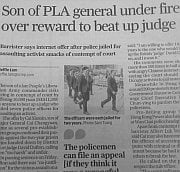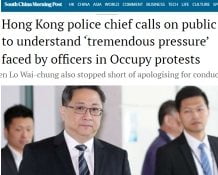The conviction of the seven cops who beat Ken Tsang is long-overdue justice in the view of pan-democrats and, in theory, anyone who supports rule of law. To rabid patriots and anti-Occupy protestors, however, the two-year sentences are overly harsh, the evil work of white-skinned dogs, or otherwise wrong. Some Mainland military scion is offering a reward to whoever assaults the judge.
Officials are in an awkward position. Justice Secretary Rimsky Yuen warns against inappropriate criticism of the judiciary. Police chief Stephen Lo can’t quite bring himself to admit his men committed a crime, and whines about the pressure they were under during Occupy. With the cops’ union demanding a pardon for the seven, perhaps he perceives possible severe disgruntlement – don’t call it mutiny – in the ranks.
No-one mentions where this pressure came from.
Chief Executive CY Leung, presumably at the behest of Beijing’s Liaison Office, systematically set about demonizing the pro-democracy activities and protests before,  during and after the Occupy/Umbrella movement. He alleged (with no evidence) that foreign influences were behind the protests. Government-friendly media pushed the lines that Occupy ‘damaged rule of law’, harmed Hong Kong’s international reputation and was wrecking the economy. The business community was enlisted to sign statements warning of costly disruption and to publicly make elaborate contingency plans as if chaos loomed.
during and after the Occupy/Umbrella movement. He alleged (with no evidence) that foreign influences were behind the protests. Government-friendly media pushed the lines that Occupy ‘damaged rule of law’, harmed Hong Kong’s international reputation and was wrecking the economy. The business community was enlisted to sign statements warning of costly disruption and to publicly make elaborate contingency plans as if chaos loomed.
Marchers and demonstrators had reported for several years that the police were becoming less tolerant of the right of assembly. The firing of 87 rounds of tear gas on September 28, 2014 represented a major shift in police tactics. Either the crowd genuinely posed an unprecedentedly serious threat by modern Hong Kong protestors’ standards (as a foreign-backed insurrection might) – or it did not, but the cops had been prepared or ordered to react as if it did. Plenty of other incidents beside Ken Tsang’s case (like enabling thugs to attack protestors) suggest that the rank-and-file police had been psyched-up to see the pro-democracy movement as a public threat.
In the background to all this is Beijing’s White Paper on how Hong Kong had no intrinsic rights, and the subsequent heavy-handed denial of democracy in the city. Specifically, Mainland officials hinted (not for the first time) that civil-service neutrality was an incorrect idea – that state agencies exist to serve the government, not the public.
Since then, not only the cops, but other public servants have been corrupted in this way. Returning officers now supposedly have the legal right and telepathic powers to impose Thought Tests on candidates for election. The Electoral Office has mysteriously acquired the right to censor election materials, with help from the Post Office. The politicization of university governing bodies is also part of this trend.
This is what Beijing, CY Leung and his local officials have unleashed. In this sense, the front-line cops can make a case for being victims.


Do you think I would leave you lying
When I can lie my ass off too
If someone sqawks
In the witness box
I’ll cover up up for you
I’ll tell a pack of lies
Pull the wool over their eyes
The way the sergeant taught us to
Before you count to three
We’ll be off scot-free
We’re seven little boys in blue.
Oh, thought you ought to know. Donald Tsang got convicted.
Hurrah for a bit of vintage Billy Connolly!
Leticia Lee supporting the Police is actually one of the weirdest stories in HK.
Thank God for the legal system and the judiciary – the last bastion…
This is a very true and mysteriously diffuse article.
It is particular… about the police; but generic… about the responsibilities of those charged with public power.
It is not encouraging… except in that it is truthful.